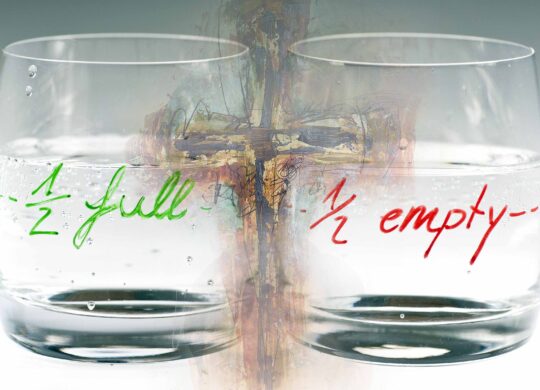Positivity?

Glass half full or half empty? That depends on the mindset of the one looking, right?
For the “half empty” folks, there is a term for the pessimism they espouse: toxic negativity. We intuitively know that toxic negativity ain’t good for you or those around you.
Then there are those “half full” folks, who always see the shining light on those storm clouds, claiming, “Well, at least it is not …” or “Look on the bright side ….” Etc. That kind of attitude and reaction apparently has its own name: toxic positivity! I.e., the ignoring or suppressing of anything that might trigger negative emotions, even to the point of invalidating real fear, real anxiety, real grief.
Wrote Linda Gallagher, an organizational psychologist:
While it is well-intentioned, toxic positivity suppresses emotions. … It is increasingly taking hold in the workplace as leaders lean into optimism in the face of massive COVID-19 economic and social impacts.”
However, accepting negative emotions, has … positive effects, if you get my drift. A collaborative study from University of Toronto and UC, Berkeley, published in the Journal of Personal and Social Psychology, “The Psychological Health Benefits of Accepting Negative Emotions and Thoughts” concluded:
Acceptance of negative emotions has been linked with greater psychological health.”
This is apparently true when we accept our own negative emotions, or others accept ours without judging us or steamrolling them with toxic positivity.
Gallagher continues:
When toxic positivity occurs in the workplace, it is often triggered by fear of negative energy permeating the team. It happens when people in an organization are discouraged from saying what they are really thinking and feeling. The result is that people start to withhold a lot of their own thoughts and feelings, creating high levels of emotional labor (projecting one set of emotions while actually feeling others). The first casualty of this type of environment is trust.”
Because such toxic positivity is essentially a lack of compassion to others’ fears, anxieties, griefs. “Try to be more positive” is simply telling another that they and their negative feelings are wrong. It is a denial, invalidation, and cancelation of authentic human concerns.
Psalm 44 begins with an account of deliverance in the past (44:1–3): “God, you did great stuff for our ancestors in the past.” And so there is dependence in the present (44:4–8): “God, because of what you did in the past, I’m trusting you in the present.” So far, so good.
Then comes the disaster in the present (44:9–16), the negativity:
You rejected and disgraced us ….
You sold Your people ….
You made us a reproach to our neighbors,
derision and ridicule to those around us.
Psalm 44:9, 12, 13
Etc. Not glossed over at all!
But there’s more. As far as the psalmist and his cohort are concerned they haven’t done anything wrong and there seems to be no reason for God’s rejection of them in this disaster. So they protest, “Why?”—a disputation in the present (44:17–22).
All this has come upon us, but we have not forgotten You. …
Yet You have crushed us ….
Psalm 44:17, 19
The agonizing psalm concludes with a plea for deliverance in the future (44:23–26):
Rise up [as] a help for us,
and redeem us for the sake of Your lovingkindness.
Psalm 44:26
Strikingly, there is no answer to their “Why?”
No, there is no toxic positivity here. No rejection of the fears, anxieties, and griefs being experienced.
But there is one ray of hope. The last word of the psalm: “lovingkindness.”
May it ever be upon us, O God!
SOURCES:
Fast Company; Journal of Personal and Social Psychology











 Abe Kuruvilla is the Carl E. Bates Professor of Christian Preaching at The Southern Baptist Theological Seminary (Louisville, KY), and a dermatologist in private practice. His passion is to explore, explain, and exemplify preaching.
Abe Kuruvilla is the Carl E. Bates Professor of Christian Preaching at The Southern Baptist Theological Seminary (Louisville, KY), and a dermatologist in private practice. His passion is to explore, explain, and exemplify preaching.